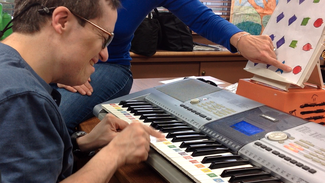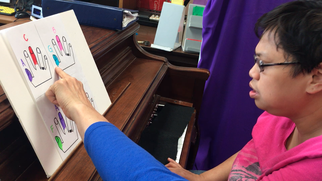How I created Sparticles . . .
For many years I'd wanted to create a video game that would teach musical concepts to children. I read and researched but it was all just in my imagination until I met the folks at Garden Center Services, a day program for adults with Developmental Disabilities.

From 2011 to 2016 I worked there with a diverse population of over a hundred adults with physical and cognitive challenges.
During this time I was learning from them and developing my method – Sparticles. By relating to each person and finding what worked for them.
During this time I was learning from them and developing my method – Sparticles. By relating to each person and finding what worked for them.

My goal was to make music accessible and engage people at any level. Seeing each person roughly once a week for ten to twenty minutes we experienced a lot of success.
But this method is not limited to people with cognitive or physical challenges – Sparticles is for everyone. Because it’s fun!
But this method is not limited to people with cognitive or physical challenges – Sparticles is for everyone. Because it’s fun!
Below are some videos from my time at Garden Center and in my other work with developmental disabilities - you can see how much fun we had!
|
|
|
|
Some other results:
- An adult man with Downs Syndrome and no prior musical training is now playing chords from memory, reading sheet music and learning different chord voicings.
- An adult with Autism was able to play the bass notes to his favorite song the first time he tried which lead to further engagement, learning and success.
- A developmentally disabled woman with the use of only one hand has worked once a week for over two years on playing "You Are My Sunshine." In the process she has gone from using one finger to play the piano to using all five.
- A developmentally disabled senior citizen has been working with me every week for two years on playing the Blue Danube Waltz. She's gone from reading the colors and shapes, to reading the actual sheet music. Now she improvises her own ending and is able to remember more and more each week without looking at the chart.
- A woman with severe dementia plays the drums with her classmates. Her engagement and joy come through in her smile.
- A group of three women, all of different ages play in a group and learn together; they work on their favorite songs, each playing at her own level.